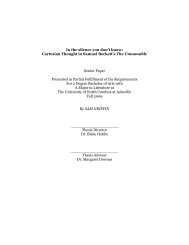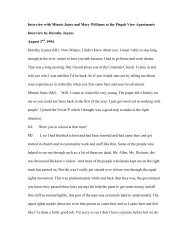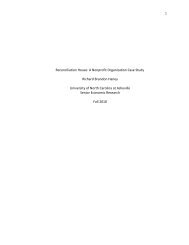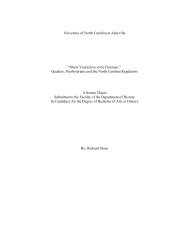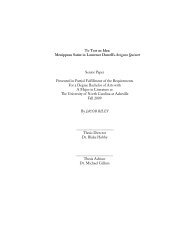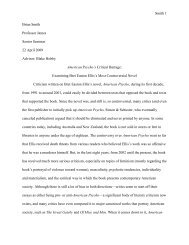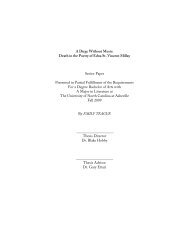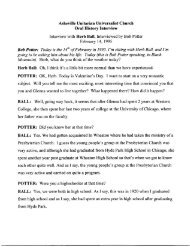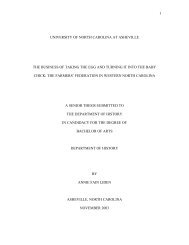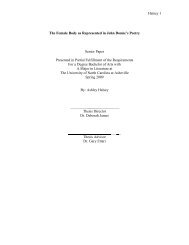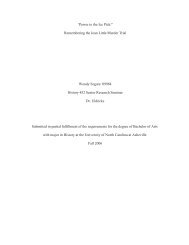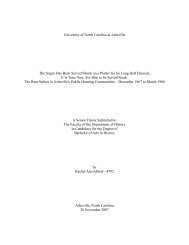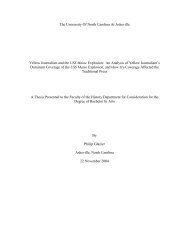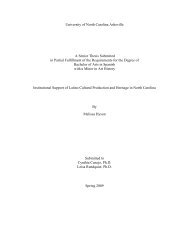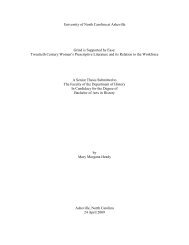Mark Twain's Writing During his Last Twenty Years: The Conflicts of ...
Mark Twain's Writing During his Last Twenty Years: The Conflicts of ...
Mark Twain's Writing During his Last Twenty Years: The Conflicts of ...
You also want an ePaper? Increase the reach of your titles
YUMPU automatically turns print PDFs into web optimized ePapers that Google loves.
Arghiere 16<br />
American thought in the late nineteenth-century: “science around 1870. Its authority was<br />
immense. It was based on the compelling idea that the creation was reasonable, whole, and<br />
orderly. What is more, it worked. <strong>The</strong> marvelous technological progress <strong>of</strong> the time proved it”<br />
(10). As Paine indicates, Twain, who was fascinated with many <strong>of</strong> the technological<br />
advancements <strong>of</strong> <strong>his</strong> time, held an interest in science which “amounted to a passion” (“<strong>Mark</strong><br />
Twain’s Social Darwinism” 165). Furthermore, Twain is said to have read scientific articles and<br />
books assiduously, including those <strong>of</strong> nineteenth-century thinkers such as astronomer Simon<br />
Newcomb, geologist Nathaniel Shaler, biologist Ernst Haeckel, astronomer Garrett Serviss,<br />
physicist Sir Oliver Lodge, biologist Sir John Lubbock, Darwin, and T.H. Huxley (Waggoner<br />
361). Most significant among these names for Twain and <strong>his</strong> later writing are perhaps Darwin<br />
and Huxley.<br />
Twain’s theory <strong>of</strong> determinism, for instance, seems to bear the influence <strong>of</strong> Darwinian<br />
and evolutionary ideas. His theory, as it suggests that human beings are “moved, directed,<br />
COMMANDED, by exterior influences—solely” (337) and that the human “brain is so<br />
constructed that it can originate nothing whatever,” (“What Is Man?” 339) would seem to carry<br />
Darwin’s ideas on human evolution and natural selection to an extreme by attributing all human<br />
behavior and thought to natural, external influences such as heredity, training, and environment.<br />
Some <strong>of</strong> Twain’s interpretations <strong>of</strong> Darwinian and evolutionary ideas, in addition, evoke <strong>his</strong><br />
theory <strong>of</strong> determinism, as in a remark to Paine in 1906 on <strong>his</strong> feelings regarding Darwin’s theory<br />
on the descent <strong>of</strong> man, “We don’t create any <strong>of</strong> our traits; we inherit all <strong>of</strong> them” (“<strong>Mark</strong> Twain’s<br />
Social Darwinism” 167). T<strong>his</strong> comment undeniably parallels passages in What Is Man? such as,<br />
“Personally you did not create even the smallest microscopic fragment <strong>of</strong> the materials out <strong>of</strong><br />
which your opinion is made . . .” (337). <strong>The</strong> psychological egoism Twain includes in <strong>his</strong> theory



